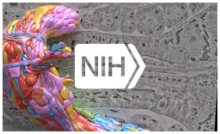
The 2021 class of new National Academy of Medicine (NAM) members includes Drs. Kafui Dzirasa, Zhigang He, and Feng Zhang, scientists who have been supported by BRAIN Initiative funds.
Election to the National Academy of Medicine (NAM) is considered one of the highest honors given to scientists in the fields of health and medicine and signifies outstanding professional achievement and commitment to service. Established in 1970, the NAM serves alongside the National Academy of Science and the National Academy of Engineering as a national and international advisor on critical issues in health, medicine, and policy. New members are selected based upon their impact and contributions to the advancement of the medical sciences, health care, and public health. This year, three scientists, Drs. Kafui Dzirasa, Zhigang He, and Feng Zhang, who have been supported by BRAIN Initiative funds, are among the 100 new NAM members.
Kafui Dzirasa, M.D., Ph.D. is the K. Ranga Rama Krishnan Associate Professor in the Department of Psychiatry and Behavioral Sciences at Duke University, current member of the BRAIN Multi-Council Working Group (MCWG), and recently named Howard Hughes Medical Institute Investigator. His laboratory investigates the role of circuits in the brain that can go awry in psychiatric disorders such as depression, schizophrenia, and bipolar disorder. He has been elected to the NAM for his contributions to the neuroscience of emotion and mental illness, for pioneering neural recording methods and analysis, as well as for his contributions in mentoring, diversity, and science policy and advocacy. Through his BRAIN grant, his team developed a new scalable technology to “functionally” study the geometry of the brain from 3D by biologically projecting it onto a 2D surface that can be imaged in real time.
Zhigang He, M.D., Ph.D., is a professor of neurology and ophthalmology at Harvard Medical School, as well as a Boston Children’s Hospital principal member at the Harvard Stem Cell Institute. His laboratory investigates the processes involved in rebuilding neural circuits in the brain following injury. He has been elected to the NAM for his groundbreaking discoveries on axon regeneration and repair, as well as his work to identify molecular targets for use in restorative therapies to treat neurodegenerative disorders, stroke, glaucoma, and spinal cord injury. Through one BRAIN grant, his team worked on generating novel tools that enable circuit- and neuron-type-specific investigations across multiple species. In a second grant, he is collaborating with researchers at Duke University to uncover activity patterns of cortical neurons that are signatures of pain sensation through large scale imaging and recording studies, as well as delineating critical circuit elements that either facilitate or attenuate pain.
Feng Zhang, Ph.D., is the James and Patricia Poitras Professor of Neuroscience at Massachusetts Institute of Technology, Investigator at the McGovern Institute for Brain Research at MIT, as well an Investigator at the Howard Hughes Medical Institute. His laboratory develops and leverages molecular engineering approaches including genome-editing tools to develop robust therapeutic strategies for the treatment of complex psychiatric and neurological disorders. He has been elected to the NAM for his pioneering development of technologies including optogenetics and CRISPR-mediated genome editing, as well as for outstanding mentorship and professional services. Through his BRAIN grant, his lab worked on developing a transformative non-invasive technology to report neural activity by using neurons’ natural export delivery systems.
